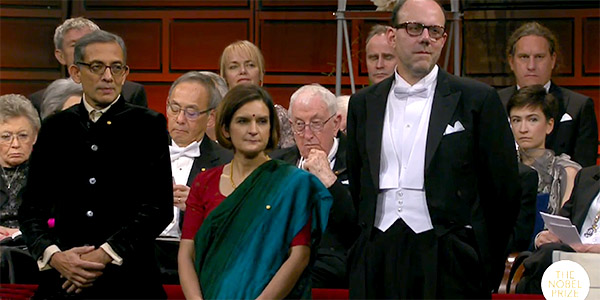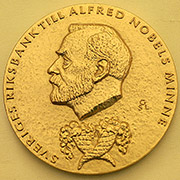 MIT Professors Abhijit Banerjee and Esther Duflo, and Professor Michael Kremer of Harvard—the 2019 laureates in Economic Sciences—at the 2019 Nobel Ceremony; photo courtesy of The Nobel Foundation
MIT Professors Abhijit Banerjee and Esther Duflo, and Professor Michael Kremer of Harvard—the 2019 laureates in Economic Sciences—at the 2019 Nobel Ceremony; photo courtesy of The Nobel Foundation
“The significance of Abhijit’s and Esther’s scholarship is not only that it has transformed the ways in which economists and policymakers think about and approach poverty alleviation, but that, at the core, their research is guided by deeply humanistic values. In their vision, the materially poor are at the center, as are remedies for global poverty that actually work, that open doors for millions to education, health care, economic well-being, and safe communities — to the full promise of human life.”
— Melissa Nobles, Kenan Sahin Dean, MIT School of Humanities, Arts, and Social Sciences
The Sveriges Riksbank Prize in Economic Sciences
Abhijit Banerjee, Esther Duflo, and Michael Kremer were awarded the 2019 Nobel prize in Economic Sciences “for their experimental approach to alleviating global poverty.”
Information, Videos, and Photographs at the Nobel website
2019 Nobel Prize Ceremony
Presentations to Professors Banerjee and Duflo begin at 1:22. | Video
2019 Sveriges Riksbank Lectures in Economic Sciences | Video
Story by Peter Dizikes at MIT News
Excerpt
Esther Duflo and Abhijit Banerjee, MIT economists whose work has helped transform antipoverty research and relief efforts, have been named co-winners of the 2019 Sveriges Riksbank Prize in Economic Sciences in Memory of Alfred Nobel, along with another co-winner, Harvard University economist Michael Kremer.
The work of Duflo and Banerjee, which has long been intertwined with Kremer’s, has been highly innovative in the area of development economics, emphasizing the use of field experiments in research in order to realize the benefits of laboratory-style randomized, controlled trials. Duflo and Banerjee have applied this new precision while studying a wide range of topics implicated in global poverty, including health care, education, agriculture, and gender issues, while developing new antipoverty programs based on their research.
